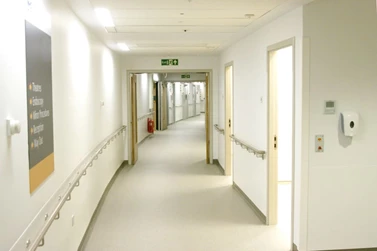Medical Negligence Solicitors
With decades of pioneering advancements in medical negligence law, Thompsons Solicitors has consistently delivered justice and secured rightful compensation for victims. Our legacy is built on a foundation of trust, expertise, and unwavering dedication to your cause.
Currently, we represent numerous women impacted by the malpractices of the rogue surgeon, Ian Paterson, who faced imprisonment in 2017 for 17 counts of intentional wounding. Beyond this, our expertise encompasses cases of misdiagnoses, as well as brain, spinal, and birth injuries resulting from negligence, whether within the NHS or private healthcare.
The Times has consecutively honoured our medical negligence legal team for four years, underscoring our position as industry-leading experts in clinical negligence.
Pursue Medical Negligence Claims with Confidence: No Win, No Fee
At Thompsons, we champion your right to justice without financial risk. Initiate your clinical negligence claim on a no-win, no-fee basis, ensuring you only contribute to legal fees upon a successful outcome.
This means that the insurers of whoever was responsible for the negligence cover most of your legal expenses if your claim is successful. The remainder of the legal fees are deducted from your compensation.
Unlike many other law firms, Thompsons limits the amount of these deductions from your compensation to cover these fees, ensuring that you have more of the compensation than you may get if you went to another law firm. Talk to us today for a confidential, no-obligation discussion about how this works.
Remember, if the claim is unsuccessful, you do not pay anything.
To bolster your financial stability during litigation, we strive to secure interim financial support whenever feasible.
Medical Negligence Support
If you’re concerned about medical care that you or a loved one has received, there are a number of places that can offer you potential support. Alongside talking to our dedicated medical negligence solicitors for legal advice, the selection of following specialist organisations can also help you with information, advice and ways to raise your issues with the organisations responsible for your treatment or care.The General Medical Council (GMC) hears complaints about serious professional misconduct by a GP or hospital doctor. Tel: 020 7580 7642
You can contact the Ombudsman for the relevant health service here:
England: Parliamentary and Health Service Ombudsman
Scotland Scottish Public Services Ombudsman
Wales The Public Services Ombudsman for Wales
Northern Ireland Northern Ireland Public Services Ombudsman
The Patient's Association is a campaigning body which is a useful source of advice and assistance for individuals who are not happy with their treatment by the NHS. Tel: 0800 345 7115
Action for Victims of Medical Accidents (AVMA) advises those who have been injured as a result of clinical treatment. Their address is: 44 High Street, Croydon, Surrey CR0 1XB. Tel: 020 8291 2793
National Institute for Health and Care Excellence (NICE) is an independent organisation responsible for providing national guidance on promoting good health and preventing and treating ill health.The General Dental Council is an organisation which regulates the dental profession in the UK.The Nursing and Midwifery Council is an organisation set up by Parliament to protect the public by ensuring that nurses and midwives provide high standards of care to their patients and clients.
Our Medical Negligence Solicitors
At Thompsons Solicitors, we have a dedicated team of lawyers who specialise in winning medical negligence claims for our clients. If you’re ready to talk about your case, one of our medical negligence lawyers would be happy to help.
Call us on 0800 0 224 224Frequently asked questions about clinical negligence claims
Medical negligence, also known as clinical negligence or medical malpractice, occurs when poor care by a healthcare professional causes illness or injury that could have been avoided.
Examples of medical negligence include failure to properly diagnose a condition, prescription errors, and surgical mistakes.
Clinical negligence can have serious consequences for the patient. For example, substandard care during childbirth can lead to serious birth injuries like cerebral palsy, while a late diagnosis of cancer can have devastating effects.
A medical negligence compensation claim is a legal process initiated by someone who feels they have been harmed due to the negligence of a healthcare professional. The aim is to secure financial compensation from those responsible.
The claimant in a medical negligence case seeks to prove the care they received was below the standard reasonably expected of the practitioner, and that the negligence directly caused them harm and suffering.
A medical negligence claim aims to secure financial compensation from those responsible for medical negligence. If you have been injured as a result of negligent treatment, you may be able to get medical negligence compensation.
The first step to making a claim is to speak to a medical negligence legal expert about your case.
Medical negligence cases are often complex, but getting legal advice from Thompsons’ clinical negligence solicitors is simple.
If you believe you have been the victim of medical malpractice, submit an online enquiry form. One of our medical negligence lawyers will get back to you shortly to discuss your case and provide free, no-obligation advice. Alternatively, you can call our experts on 0800 0 224 224.
Before a clinical negligence claim can be made, you must make a formal complaint to the relevant hospital or healthcare provider. Their response after investigating your complaint is often key to building a case. If you haven’t already made a formal complaint, our experts can advise you on how to do so during the initial discussion of your case.
A patient recall letter or medical recall letter is sent by a medical trust or hospital to people who have previously received treatment from them.
The letter explains that there may have been an issue with the treatment received and asks the recipient to come in again to be re-examined.
If you have received a recall letter from your healthcare provider, you should first seek medical attention. You may then want to speak to our experts to assess whether you have a case for clinical negligence compensation.
There are a number of elements to establishing whether medical treatment was negligent.
The patient has to prove (on "the balance of probabilities") that the clinical practitioner has been negligent. This means showing that the standard of care fell below what could 'reasonably have been expected'.
Medical opinion often differs over treatment for a particular ailment, and it can be a valid defence to show that the treatment was in accordance with the views of 'a responsible body of medical opinion'.
Even if you can show that the standard of care was negligent, you’ll also have to prove that the negligence caused the injury. This is often the trickiest part of the case. The medical practitioner may claim that the injury arose from the illness itself rather than the treatment, or that the injury would have come about regardless of their actions. Detailed medical evidence will be called, with specialists arguing for each side.
We work with highly experienced medical experts to collect evidence and build the strongest case possible for our clients.
The NHS is an invaluable public service, but occasionally the high standards of NHS medical professionals can slip.
If you have experienced negligence while receiving treatment from the NHS, you can make a claim for compensation.
Whether the negligence occurred at a GP surgery, a hospital, a pharmacy or elsewhere, if you have been harmed as a result of poor medical care you are able to make a claim.
Yes. A medical malpractice claim can be brought against anyone involved in your treatment, whether it was provided by the NHS or privately.
If you suffer an injury or illness caused by private healthcare treatment, we can help. Our clinical negligence lawyers have decades of experience helping people who have suffered from negligent treatment provided by private healthcare professionals – including victims of disgraced surgeon Ian Paterson, who operated from both private and NHS hospitals in the West Midlands.
Call us on 0800 0 224 224 to discuss your claim.
The process of making a medical malpractice claim with Thompsons is as follows:
- Before you can start a legal claim, you must first make a formal complaint to the hospital or health board. Make sure you do this as soon as possible, as there is only three years to make a legal claim in most cases. Contact us if you need advice on how to make your formal complaint.
- Once they have responded, contact your solicitor to begin your claim.
- To start a claim, we have to access and check your medical records.
- We will then instruct specialist medical experts to consider whether or not the treatment was negligent, and if it was, what damage was caused.
- If we consider that we have enough evidence to prove the case for clinical negligence, we will advise you to allow us to start court proceedings immediately.
Clinical negligence cases can be settled by negotiation without the need to proceed to a full trial, but they are rarely resolved without starting court action.
Yes – as with most personal injury claims, the time limit is three years from the date of injury or diagnosis. However, in medical negligence cases the cut-off point is measured from the time when you could have first reasonably judged that your symptoms were caused by medical negligence, or that your medical treatment had caused you injury.
For example, if an accident during childbirth caused immediate and obvious harm to the mother or child, you would have three years from that date to start a clinical negligence claim. If, however, you were given surgical treatment which decades later transpired breached guidelines or was incorrect – as happened to our many Ian Paterson clients – you would still be entitled to make a surgical negligence claim provided you started that claim within three years of the date of knowledge of the negligence.
This three-year rule doesn’t apply to children. A parent or guardian can pursue a compensation claim on behalf of a child any time from when the negligence occurred until their 18th birthday. From the child’s 18th birthday, they have three years to claim.
We have a full guide to medical negligence time limits here, but to avoid any complications about time limits, you should seek professional legal advice from our medical malpractice lawyers as soon as possible.
Yes. You can start a medical negligence compensation claim on behalf of a deceased family member or a loved one who cannot manage their legal affairs due to their mental capacity. Contact our experienced clinical negligence lawyers for professional, no obligation advice about making a claim on their behalf.
The compensation you receive as part of your medical negligence claim will vary depending on the severity of your injuries and their impact on your life. Generally, the more severe your injury or illness, the higher the compensation award. If the effects of the negligence have left you unable to work, you can also be compensated for lost income.
Due to the complex nature of medical negligence cases, it can take some time before claimants receive a compensation offer. While some clinical negligence claims can be proven and settled within months, others can take longer. In the most serious and complex cases, especially the rare cases which make it to court, it can take years before compensation is awarded. This is why we seek interim financial support wherever possible.
Striking the right balance between settling cases quickly and achieving the appropriate amount of compensation is a priority for our clinical negligence solicitors. We understand you may want to avoid a lengthy legal process and move on with your life, however we are also passionate about securing you the maximum compensation possible.
Our priority throughout is to keep you fully informed about where your case is at with regular updates and communication. We are committed to minimising any burden or concerns throughout the legal process.
We can help you make a claim if you have experienced any form of negligent treatment that has left you with an illness or injury.
Some of the claims we have helped our clients with include:
- Doctor negligence claims
- Hospital negligence claims
- Surgical negligence claims, including orthopaedic claims
- Misdiagnosis claims, including cancer misdiagnosis claims
- Birth injury claims, including cerebral palsy claims
- Childbirth tear claims
- TVT mesh claims and rectopexy mesh claims
- Fatal medical negligence claims
- Prescription error claims.
Thompsons Solicitors have offices across England and Wales, including:
- Birmingham
- Bristol
- Cardiff
- Dagenham
- Harrow
- Leeds
- Liverpool
- Llanelli
- London
- Manchester
- Newcastle
- Nottingham
- Oxford
- Plymouth
- Sheffield
- Stoke
We know that medical injuries can have a significant impact on health and mobility, so we also offer telephone or video meetings. In some cases, our lawyers will also visit your home to discuss your case.
Why choose Thompsons?
Since 1921, we have always supported the injured and refuse to act for those defending compensation claims or their insurance companies.
Our dedicated team includes members of the Law Society’s Clinical Negligence Accreditation Scheme and Action Against Medical Accidents’ (AvMA) referral panel.
We have represented clients in high profile medical negligence cases, such as victims of disgraced surgeon Ian Paterson.
Our campaigns, such as #PatientsBeforeProfits, show that we are more than just another law firm seeking compensation for injured people. We are a campaigning law firm seeking justice for our clients and fairness for anyone who has been unfairly injured.
If you are looking to make a claim, contact our medical negligence solicitors today on 0800 0 224 224 or complete our online claim form. Our initial assessment and advice is completely free of charge, so get in touch to see how we can help you.

What is medical negligence?
In this guide we explain what medical negligence consists of and what types of medical negligence that there are.
Find out more
NHS medical negligence compensation claims
In this guide we answer some of the most frequently asked questions about making a medical negligence claim against the NHS.
Find out more
Time limits for medical negligence claims
If you have experienced medical negligence, there are some time limits for making a claim that you need to be aware of.
Find out more







